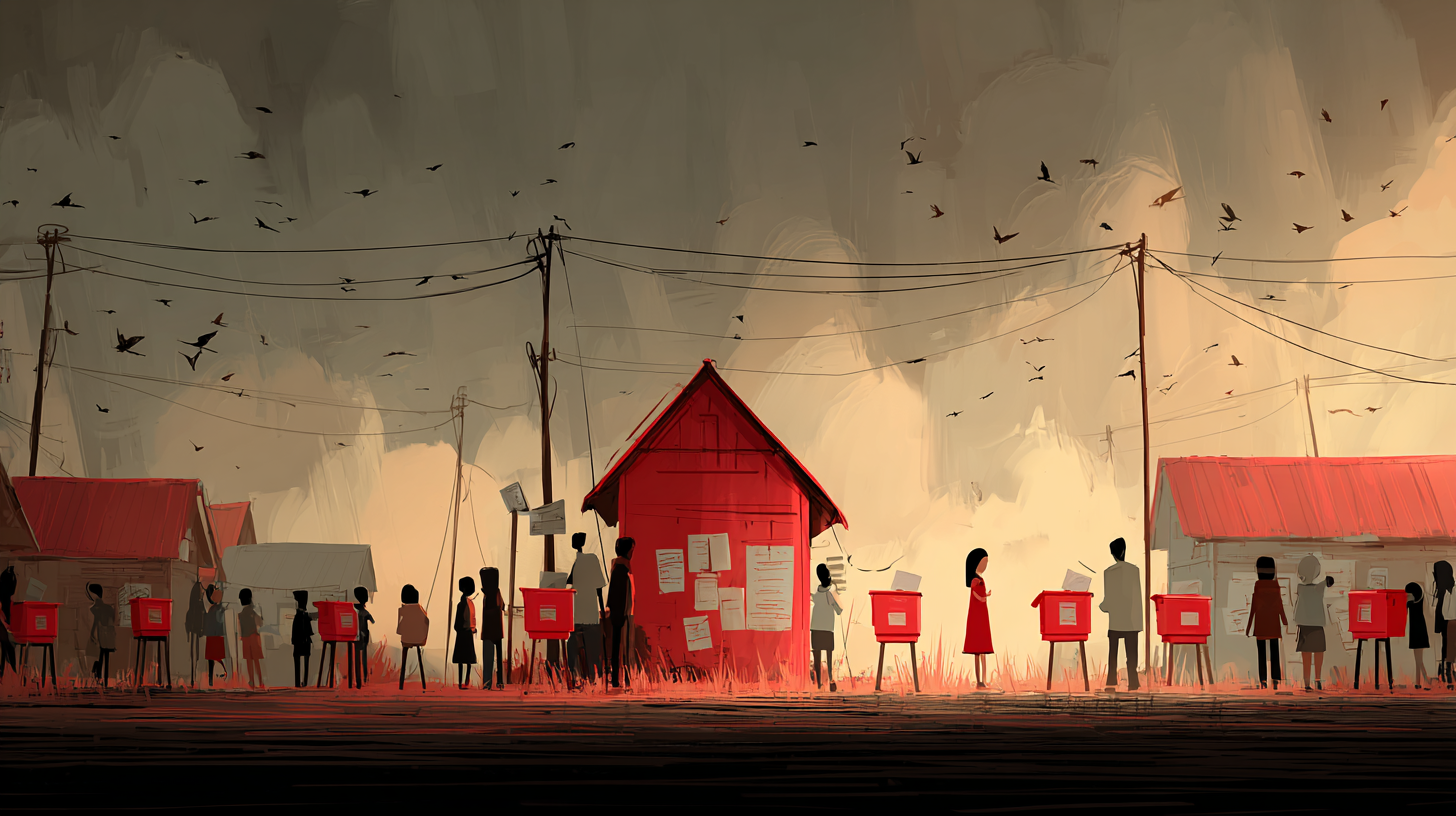An election is when people vote to choose a leader.
「election」とは、人を選ぶためにみんなで投票すること。
以下は英単語 “election” に関するストーリー型学習コンテンツです。まずは大枠の意味を理解して最後の文章で確認しましょう。
主な意味(main meaning)
| 品詞 | 意味 | 発音記号 | 例文 |
|---|---|---|---|
| 名詞 | 投票で人や方針を選ぶこと(選挙) | /ɪˈlɛkʃən/ | The country held a national election last year. |
語源(etymology)
「election」はラテン語 eligere(選ぶ)に由来し、「人々の中から選ぶ」というイメージが核にある。
類義語(synonyms)
| 類義語 | 意味 | 例文 |
|---|---|---|
| vote | 投票 | Everyone has the right to vote in an election. |
| poll | 投票、世論調査 | The poll shows that more people support the new candidate. |
| ballot | 投票用紙 | She put her ballot in the box. |
| choice | 選択 | His choice for president surprised many people. |
反義語(antonyms)
| 反義語 | 意味 | 例文 |
|---|---|---|
| appointment | 任命 | The manager got his job by appointment, not by election. |
| dictatorship | 独裁 | In a dictatorship, there is no free election. |
コロケーション(collocations)
| コロケーション | 例文 |
|---|---|
| presidential election | The presidential election takes place every four years. |
| local election | People are preparing for the local election. |
| election campaign | The election campaign lasted for three months. |
| fair election | Observers said it was a fair election. |
2項表現(binomials)
| 2項表現 | 例文 |
|---|---|
| free and fair | They wanted a free and fair election. |
| law and order | The candidate promised to keep law and order after the election. |
英語ストーリー(english story)
In a small town, people were preparing for the upcoming local election. The election was very important because the mayor would be chosen. Everyone knew that a mayor could change the future of the town. Posters were on the walls, and the election campaign had already begun.
Anna, a high school student, was excited because this would be her first chance to vote. She told her father, “It feels like I can finally have a say in the town’s future.” Her father smiled and said, “Yes, every person’s choice matters.”
On the other hand, Tom, a shop owner, was tired of the noise. “These candidates keep visiting my store to ask for support,” he said. “But I just want to run my shop in peace.” He remembered that in some countries, there was no free and fair election. “At least here, we can decide by ourselves,” he thought.
The day of the presidential election was also approaching in the country. So, people were discussing both the national and the local level. The polls showed that Candidate A was slightly more popular than Candidate B. Still, no one was sure of the result.
During the debate, Candidate A promised to keep law and order in the town. Candidate B promised to improve schools and healthcare. Many young people supported Candidate B, while older residents leaned toward Candidate A.
Finally, election day arrived. People lined up early in the morning. Anna held her ballot carefully and put it into the box. She felt proud. Tom also cast his vote, even though he was not very interested. “This is better than living under a dictatorship,” he whispered to himself.
When the votes were counted, Candidate B won by a small margin. The observers announced, “It was a fair election.” People cheered, and Anna felt inspired. “Now I see how elections shape our lives,” she thought. Her father agreed, “Democracy is not perfect, but without elections, leaders would only get power by appointment. And that would be dangerous.”
From that day, Anna decided to study politics. She wanted to understand how to make society better. The election had changed not only the town’s leadership but also Anna’s future.
和訳
小さな町で、人々は次の**地方選挙(local election)の準備をしていた。選挙はとても重要だった。なぜなら町長が選ばれるからだ。町長は町の未来を変える力を持っている。壁にはポスターが貼られ、すでに選挙運動(election campaign)**が始まっていた。
高校生のアンナはわくわくしていた。なぜなら、初めて**投票(vote)できるからだ。「やっと町の未来に意見できる気がする」と父に言った。父は笑って「そうだね。一人ひとりの選択(choice)**が大事なんだよ」と答えた。
一方、店主のトムはうんざりしていた。「候補者がみんな私の店に来て支持を求めてくる。でも私は静かに店をやりたいだけだ」と言った。彼は一部の国では**自由で公正(free and fair)**な選挙がないことを思い出した。「少なくともここでは自分たちで決められる」と考えた。
国全体の**大統領選挙(presidential election)**も近づいていたので、人々は国政と地方政治の両方を話題にしていた。**世論調査(polls)**では候補者Aの方が少し人気が高かったが、誰も結果を確信できなかった。
討論会では、候補者Aが「**法と秩序(law and order)**を守る」と約束した。候補者Bは「学校と医療を改善する」と約束した。多くの若者はBを支持し、高齢者はAを支持する傾向があった。
ついに投票日が来た。人々は朝早くから列を作った。アンナは大切に**投票用紙(ballot)**を持ち、箱に入れた。誇らしい気持ちだった。トムも投票した。あまり興味はなかったが、「**独裁(dictatorship)**で暮らすよりはましだ」とつぶやいた。
票が数えられると、候補者Bがわずかな差で勝った。監視員は「これは**公正な選挙(fair election)でした」と発表した。人々は歓声を上げ、アンナは感動した。「選挙が私たちの生活を形作っているのね」と思った。父も同意した。「民主主義は完璧じゃない。でも選挙がなければ、指導者はただ任命(appointment)**されるだけだ。それは危険だよ」と言った。
その日からアンナは政治を学ぶことを決意した。どうすれば社会をよくできるかを理解したかったのだ。**選挙(election)**は町のリーダーだけでなく、アンナの未来までも変えたのだった。
Q&A
Q: 「election」と「vote」の違いは?
A: 「election」は「選挙」というイベント全体を指します。一方「vote」は「投票する行為」や「1票」のことです。つまりelectionの中でvoteが行われます。
Q: 「election」と「poll」の違いは?
A: 「election」は正式な選挙を指し、「poll」は二つの意味があります。①選挙そのものをカジュアルに言う場合、②世論調査の意味。特に新聞やニュースではpollが「世論調査」の意味でよく使われます。
Q: 「election」と「ballot」の違いは?
A: 「election」は選挙全体ですが、「ballot」は投票用紙や投票行為を具体的に指します。例えば「She cast her ballot(彼女は投票用紙を入れた)」のように使います。
Q: 「election」と「choice」の違いは?
A: 「election」は投票によってリーダーや方針を決める制度やイベントです。「choice」は単に「選ぶこと」や「選択肢」という広い意味で、必ずしも投票に限りません。
Q: 「election」と「presidential election」の違いは?
A: 「election」は一般的な選挙全般を指します。「presidential election」はその中でも特に「大統領選挙」を意味します。
Q: 「election」と「local election」の違いは?
A: 「election」は広くすべての選挙を指し、「local election」は「地方選挙」、つまり市長や町長など地域レベルの選挙を指します。
Q: 「election」と「election campaign」の違いは?
A: 「election」は投票そのものや選挙全体のことです。「election campaign」は候補者が投票日までに支持を得るために行う活動(演説、ポスター、訪問など)を指します。
Q: 「election」と「fair election」の違いは?
A: 「election」は中立的に「選挙」を指す言葉です。「fair election」は「公正な選挙」で、不正がなく、すべての人が平等に参加できることを強調します。
こうして整理すると、「election」が基本的な「選挙」の意味で、その周辺の単語は「方法」「形態」「道具」「性質」を具体的に説明するために使われていると理解できます。



コメント